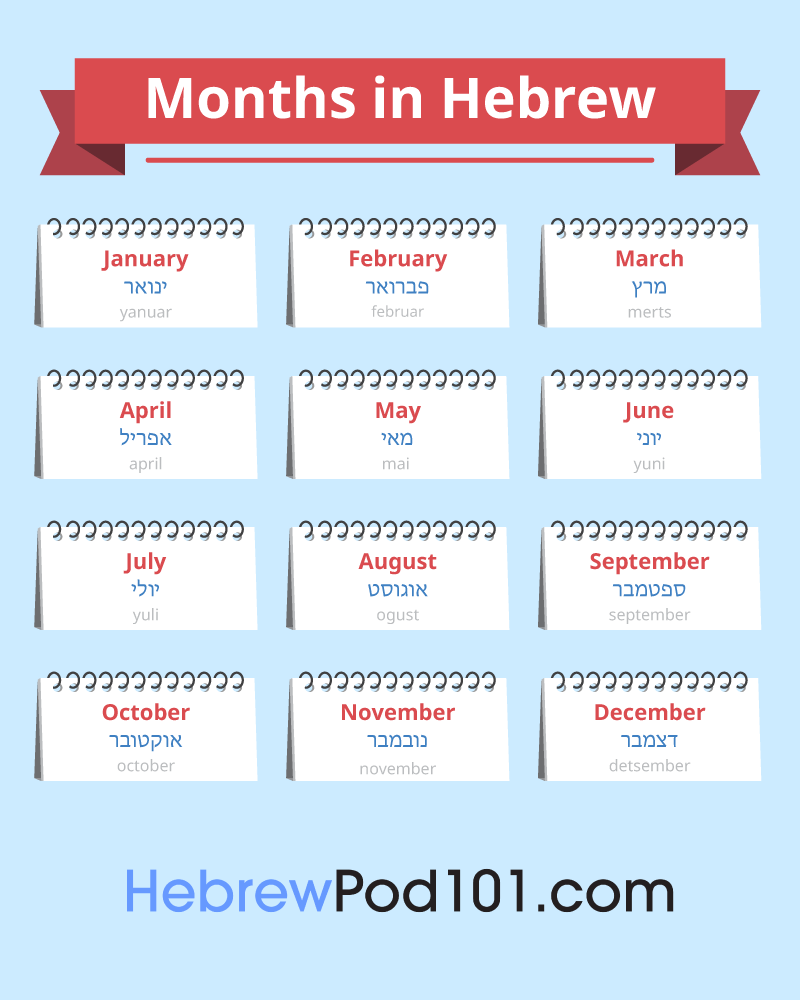Did you know there are many different types of calendars?
As you probably know – a calendar is a system of organizing days in weeks and months for specific purposes, according to Wikipedia.
Worldwide, most countries use the Gregorian calendar. Some just work on the same framework, meaning that time is divided into units based on the earth’s movement around the sun – the “solar calendar”. Other calendars keep time by observing the moon’s movements, a combination of the moon and the sun’s movements, and seasons.
Through HebrewPod101, you can learn all about this and so much more! Our themed, culturally relevant lessons are skillfully designed so you can do your planning perfectly for a holiday or a date.
Having a good plan for a visit or a trip is like studying well for an exam. You’re just so much better prepared! For that, you could well need specific phrases to plan around appointments and such, especially on business trips. Make sure to use the charts we provide here with the days of the week in Hebrew, as well as the months in Hebrew to navigate your way as you plan. Great resources!
Also – always remember to have fun!
Table of Contents
- Why Will It Help To Know How To Talk About Dates in Hebrew?
- Talking About your Plans
- Can HebrewPod101 Help You In Other Ways Too?
1. Why Will It Help To Know How To Talk About Dates in Hebrew?
Well, that’s not a difficult question to answer. No matter why you’re travelling, it would be best to at least know the names of days and months in Hebrew. You don’t want to miss your flight or an appointment because you confused “יום שישי” (“yom shishi,” Friday) with “יום שבת” (“yom shabbat,” Saturday)! Or maybe you planned a holiday for “יולי” (“yuli,” July), but you booked a flight for “יוני” (“yuni,” June) by accident!
Avoid this confusion by learning the Hebrew calendar before you leave.
Now, as promised, the 15 phrases to help you make and discuss plans.
2. Talking About your Plans
Perhaps you’re working in Israel, or maybe you’re enjoying a prolonged holiday. Fabulous! Memorize these phrases so you can be sure to successfully negotiate meetings, appointments, dates, events, the list goes on!
1. מה אתה עושה בסופ”ש הזה?
Mah atah ose ba-sofash haze?
“What are you doing this weekend?”
This question is usually a preamble to inviting someone somewhere. Given that it’s over the weekend, it probably means a casual get-together or another social event. (But not necessarily! A manager or boss could also ask this for entirely different reasons.)
It’s a handy phrase to know when you’ve made Israeli or expat friends in the country. Or, be the one doing the inviting. Then train your ear to learn the following phrases so you can understand the response.
2. אני נוסע בסוף השבוע הזה.
Ani nose’a be’sof ha’shavua.
“I am traveling this weekend.”
This could be a reply if you’re not available because you’re doing other fun stuff.
No matter why you are visiting Israel, do take the time to explore the country! It’s beautiful and it has so many wonderful, interesting spots ready to be visited.
3. אני מתכוון להישאר בבית.
Ani mitkaven lehisha’er ba’bayit.
“I am planning to stay at home.”
Maybe you feel unwell, but don’t want to give too much information? Or maybe you have work to do? Perhaps you just need some quiet gardening time…it doesn’t matter. This response is polite and honest without oversharing.
It could also be a slightly open-ended response, depending on how you deliver it. Because hey, being home could still mean your plans are flexible, right?
That said – depending on your relationship with the inviter, nuances like these will probably not be so apparent in a foreign culture. So, best to use this excuse for declining an invitation only if you are truly set on staying in.
4. השבוע אני עסוק.
Ha’shavua ani asuk.
“This week I am busy.”
Another polite phrase that gives a reason for declining an invitation but without oversharing details.
Don’t decline too many invitations, though! You don’t want people to think that you’re too busy to hang out with them. They will stop inviting you out, and you know how the saying goes – all work and no play makes Jack a dull boy…! Being social is good for the soul.
5. מחר אני חופשי.
Machar ani chofshi.
“I am free tomorrow.”
Yay! Perhaps you were approached by that person and they asked about your availability for a date. This would be a fine reply. Not too eager, but still indicating that you’re interested.
Or maybe you’re just replying to a colleague or manager’s request for a meeting. Polite, honest and clear.
Alternatively, you’re just busy right now, and plans are not going the way they were…well, planned. Compromise is a lovely thing! And this phrase sounds just like that.
Use it to indicate that you want to accommodate an invitation or the inviter’s plans, despite your current unavailability. Only if you are really free, of course.
6. האם נוכל לשנות את המועד?
Hayim nukhal leshanot et ha’moed?
“Can we reschedule this?”
So, life happened and you are unable to meet obligations or attend a planned meeting. This is a suitable question to ask if you wish to indicate your willingness to still engage with whatever is on the table.
Obviously you should (ideally) not ask to reschedule a party or big meeting! (Unless you’re the boss or it’s your own party, of course.) But if there’s reasonable wiggle room regarding arrangements, then this one’s your question.
7. יהיה לי מספיק זמן בסוף החודש.
Yihiye li maspik zman be’sof ha’chodesh?
“I will have enough time at the end of the month.”
A go-to phrase when events or activities are likely to take up a lot of your time, such as going away for a weekend, spending the day at a local market, or writing your manager’s quarterly report (with 20 flow-charts in Powerpoint) – anything that won’t only take an hour or two.
8. מתי יהיה הזמן המתאים ביותר עבורך?
Matay yihiye ha’zman ha’matyim beyoter avurkha?
“When is the best time that suits you?”
Remember phrase #5? That was a possible reply to this question. Asked by your crush, very possibly! Or, it could be asked by any other person for any other reason, doesn’t matter.
If this is addressed to you, it usually means that the person respects your time and schedule, which is a good thing. It probably also means that their own schedule is flexible, another good thing.
This is also a polite question to ask when a manager or senior colleague wants to meet with you. Let them decide on the time, and be as accommodating as possible. This attitude shows respect for seniority – good for career building. (Within reason, of course. You don’t need to postpone your wedding or your paid-up holiday to Australia because your manager wants to see you.)
9. האם התאריך הזה מתאים לך?
Hayim ha’ta’arikh haze mat’im lekha?
“Is this date OK with you?”
But – if the other party insists that you choose a time for a meeting, appointment, or date etc., then do so! Respond with this nice, somewhat casual question that leaves space for negotiation, but only needs a simple reply.
Suitable for friends, and casual acquaintances and colleagues.
10. האם אתה זמין ביום הזה?
Hayim ata zamin ba’yom haze?
“Are you available on that day?”
This is the a-bit-more-formal version of the previous question. Again, it has room for negotiation, but only needs a simple response – nice and neat!
Maybe this is the go-to question when you’re addressing your seniors at work, or a person much older than you.
11. האם נוכל לעשות זאת בהקדם האפשרי?
Hayim nukhal la’asot zot ba’hekdem ha’efshari?
“Can we do it as soon as possible?”
This question has an urgency to it that should preferably be responded to with the same. A simple reply will be good – yes or no. Less negotiable, this is still polite because it’s a question that gives you a choice.
But stand ready with one of the phrases in this article to help tie down a time and date!
12. אני זמין בכל ערב.
Ani zamin be’khol erev.
“I’m available every evening”
If you’re going to reply with this phrase, context is everything.
– If it’s your manager asking you to put in a bit of overtime, and you are available to – great reply! When deadlines are tight and everybody is stressing, your willingness to go the extra mile can only improve your relationship with your boss.
(Still, no need to be a doormat! If you get asked to work overtime too often, or if everyone else is goofing around while you have to graft, then re-evaluate the situation. And if you feel you’re being exploited a bit, don’t stress! Equip yourself with the diplomatic, yet assertive responses right in this article.)
– If it’s an old friend or longtime significant other asking to hang out – good reply. You know one another and appearances don’t matter any longer.
– If it’s a new crush who just asked when you’d be available for a date – stop. Not such a great reply. Tone down a bit! “Interested but not overly eager” is what you’re going for here.
Refer back to response #5, or use a counter-question, such as #1. Whatever suits you.
But if they – or anyone else – invite you to scale the Himalayas with them, then the next phrase will probably be the only sane response!
13. אני צריך לתכנן את זה מראש.
Ani tsarikh letakhnen et ze me’rosh.
“I need to plan this well in advance.”
So, as said under #9, perhaps you’re invited to join someone conquer the Himalayas.
Or your company manager wants you to plan the Party that Tops All Year-End Parties Forever.
Simply – if you get asked to do something that you know will need a lot of thorough planning, this is a good phrase to respond with.
It’s an assertive phrase that demonstrates two things regarding your attitude:
a) That you know your own abilities, and respect your own schedule.
b) That your respect other people’s time and schedule too.
Then just be sure to actually do that planning well in advance!
14. אנחנו צריכים למצוא תאריך אחר.
Anachnu tsrikhim limtso ta’arikh acher.
“We need to find another date.”
So, you’re in negotiations regarding a date.
This is an assertive statement that should probably not be used with a “My way or the highway” attitude.
That stuff only works in the movies – think sharp-tongued Samuel L. Jackson. Or fierce Kristen Stewart. Yea, they can be scary, so tone down that tone.
Also, be mindful that fickle people who change plans all the time don’t keep friends! Taking others’ needs into consideration, while simultaneously having your way is a delicate art that takes proper cultivation. Use this phrase sparingly – we have better ones here to negotiate with.
Of course, if your planned trip to the dentist falls on the same day as the only Billie Eilish concert close by…well, priorities are priorities. Feel free to call the dentist with this phrase. Or even better, use the next one.
15. אני לא יכול לעשות את זה ביום הזה.
Ani lo yakhol la’asot et ze ba’yom ha’ze.
“I cannot do it on that day.”
This is the low-key-but-still-firm cousin of the previous phrase. You’re stating a personal fact, and depending on your tone, this can be as non-negotiable as you prefer.
Again, only use this when you really mean it, if you’re visiting Israel or any other foreign country.
So, that’s it, folks! Which phrase did you find the most helpful? Let us know in the comments!
3. Can HebrewPod101 Help You In Other Ways Too?
Well yes, of course!
We think you will find these phrases easy to use when talking about dates and months in Hebrew. But knowing how to employ them properly could help you avoid sticky situations!
HebrewPod101 is uniquely geared to help you with this and so much more.
This InnovativeLanguage.com initiative is one of many online language-learning courses. With us, you’ll find it easy and fun to learn a new language, and here are a few reasons why:
- Immediately upon enrollment, you’ll receive hundreds of well-designed lessons to get you going.
- Watch superb recordings of native Hebrew speakers in cool slide-shows – the easy way to practice till you sound just like a native speaker yourself!
- Also immediately upon enrollment, you’ll get access to a huge library of free resources! These include extensive, theme-based Vocabulary Lists and a Word of the Day List (For free, hot bargains!) These alone are sure to give your vocab-learning boxing gloves.
- You’ll also immediately be able to use an excellent and free Hebrew online dictionary. Necessary for quick, handy translations, no matter where you find yourself.
- For the serious learner, there are numerous enrollment upgrades available, one of which offers you a personal, online Israeli host. Allow us to hold your hand and support you in your learning!
If you’re serious about mastering Hebrew easily yet correctly, HebrewPod101 is definitely one of, if not the best, online language learning platforms available. Talking about your plans or dates in Hebrew need not ever spoil your stay.
So, hurry up—enroll today!





















